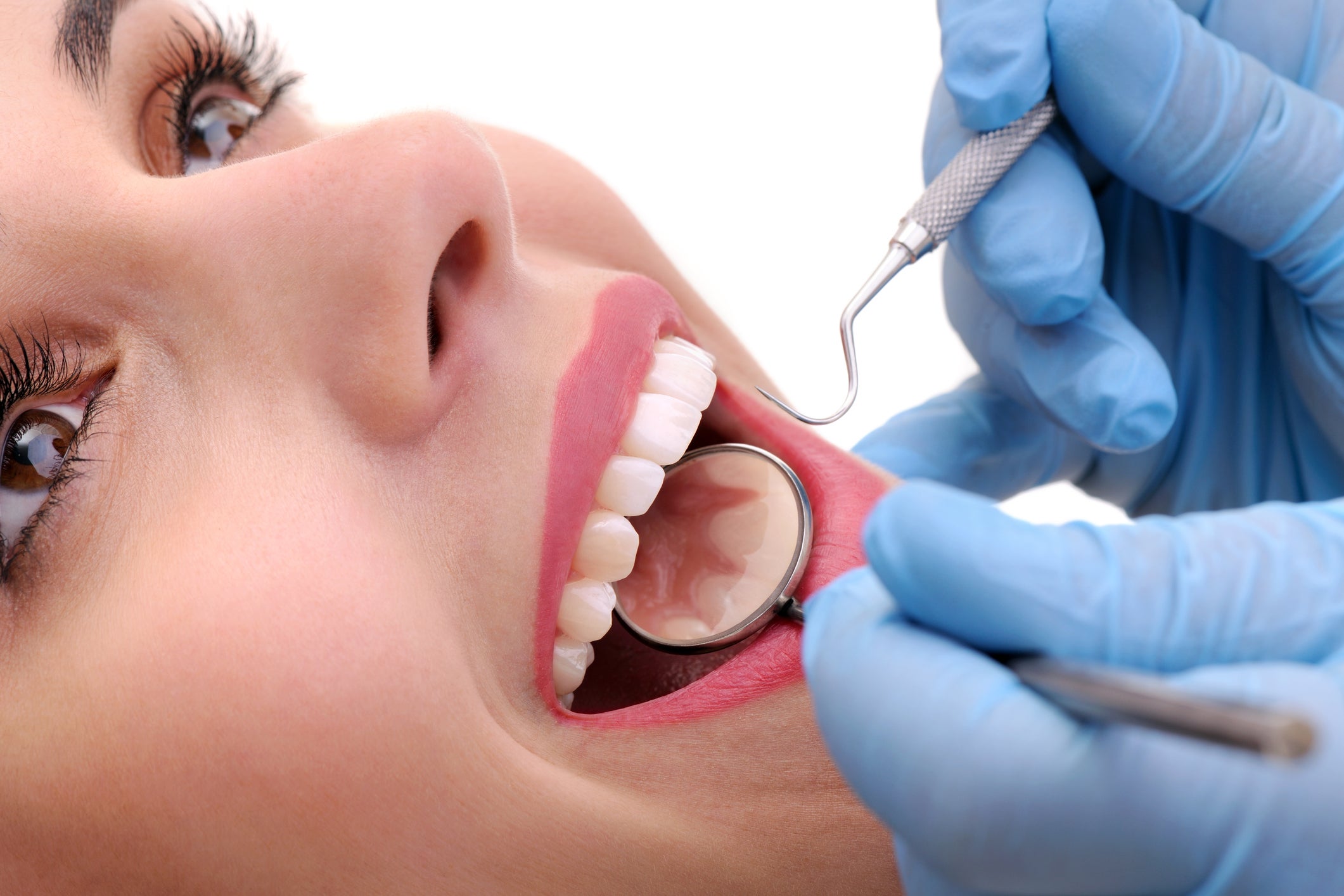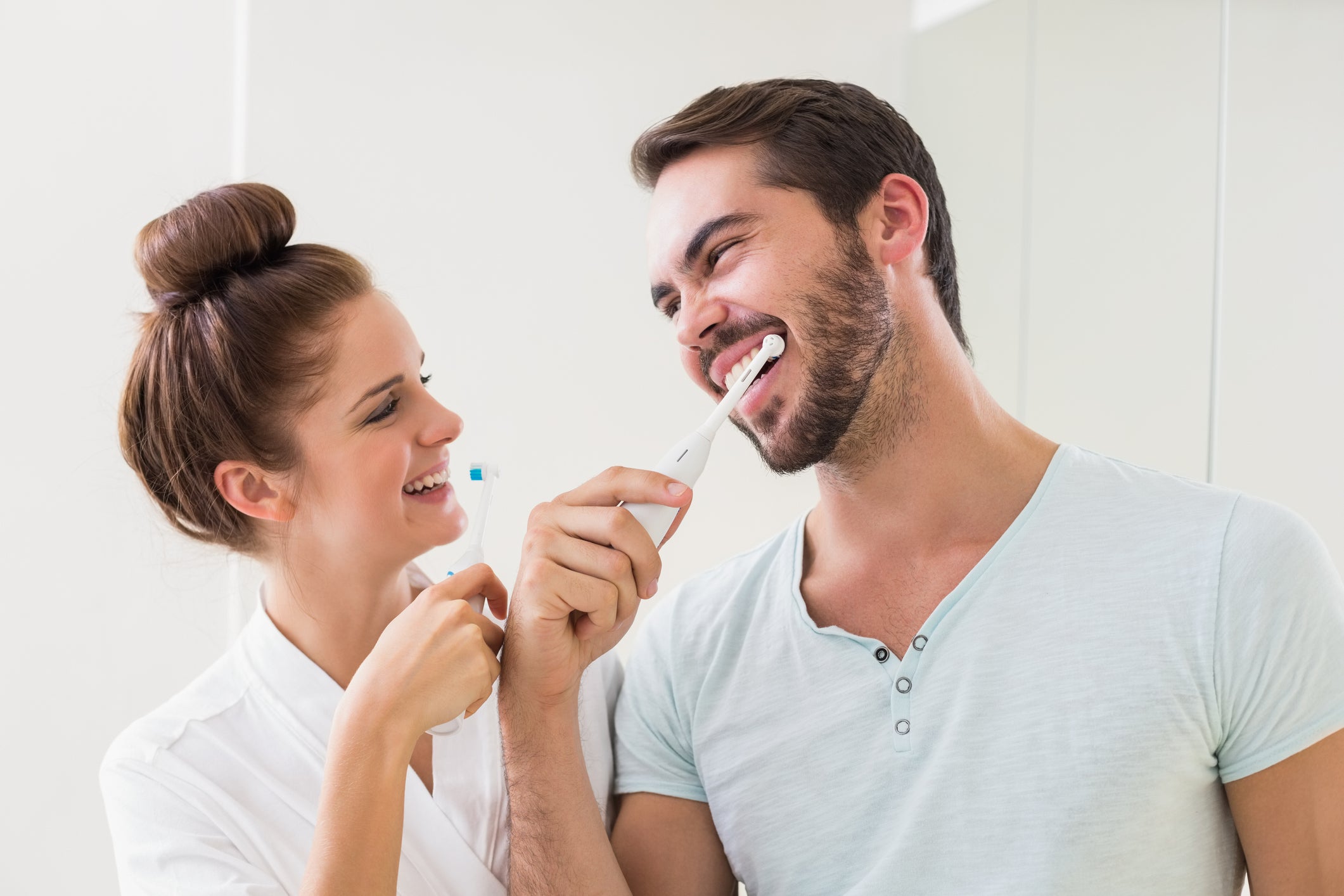-
Understanding Your Gums

You know about cavities, and tooth decay, and how important it is to brush and keep your teeth healthy. But how much do you know about the health of your gums? The gums are an important part of your mouth, and if they’re not in good shape, your whole mouth can suffer. What do you need to know about your gums?
You might have noticed that your oral hygienist or dentist probes your gums during your regular check-ups. This is to determine if your gums are fitting snugly against your teeth. Unhealthy gums have pockets of space, and the deeper the pocket, the worse your gum health. It may feel like your gums are just being poked, but what the dentist is actually doing is measuring them. The tool used to probe gums is called a periodontal probe, and it’s essentially a tiny ruler. It is inserted into pockets in your gums, and the depth is recorded in millimeters.
Your dentist will keep track of these numbers as a preventive measure against periodontal disease (gum disease). Only your dentist can diagnose gum disease, but in general, 1 to 3 mm means the gums are generally healthy, 4 mm means you need to pay more attention to your oral care, 5 to 6 mm indicates gum disease, and anything over 6 means advanced gym disease. By regularly checking gum pocket depth, your dental team can catch periodontal disease early, when it’s still relatively easy to treat.
You can look for signs of gum disease at home, too. Swollen, sore, or bleeding gums could be a sign of gingivitis or periodontal disease. Gingivitis is the early stage of gum disease, and it happens when plaque builds up at the gumline. Once it progresses to periodontitis, it can affect the bone and tissue supporting your teeth. However, these symptoms can also be caused by other conditions and even vitamin deficiencies. Hormonal changes like pregnancy, illnesses like diabetes, infections, and vitamin C deficiency can all be responsible for gum problems, so you will want to see your dentist to get the right diagnosis.
What can you do to keep your gums healthy? First, pay attention to your oral care routine. Brush twice a day and floss once a day, brushing gently so that you don’t injure your gums. Consider using a water flosser, to clean below the gumline. Eat a nutritious diet, don’t use tobacco products, drink alcohol only in moderation, and take supplements, especially if you think you are not getting enough vitamin C. See your dentist for regular check-ups and cleanings, but in between visits, pay attention to your gums so that you can make a dental appointment if you notice signs of gum disease.
At Park 56 Dental Group, we offer pediatric, prosthodontics, endodontics, oral surgery, Invisalign®, emergency, and sedation dentistry, all at the highest level of treatment. We serve the Midtown, Central Park, Upper East Side, Park Avenue, and all surrounding Manhattan and New York areas, with a patient-centered practice that has hours to fit your schedule. Schedule your complimentary consultation today by contacting us online or calling us at (212) 826-2322
-
Dental Issues That Can Trigger Headaches

A toothache can be extremely painful, and so can a headache. When they occur at the same time, it can be excruciating. Why does this happen? There can actually be a connection between dental issues and headaches. Here, we will take a closer look at why these two things are related and how dental issues can trigger headaches.
- The first factor that connects dental issues and headaches is the trigeminal nerve. This is one of the largest nerves in your head and provides sensation to most of your face. It is also the nerve that relays pain signals for almost all headaches and toothaches. That’s why a toothache or damage to a tooth can lead to a migraine. The pain in the affected tooth irritates the trigeminal nerve, and that causes a migraine headache, with symptoms like nausea, vomiting, and sensitivity to light and sound.
- If you grind your teeth, it can cause referred pain in the head. This means that even though you feel the pain in your head, it doesn’t actually have anything to do with your head. Why does this happen? It actually goes back to the trigeminal nerve. When you grind your teeth, the sensation travels through the nerve and causes a headache. Even if you don’t get a headache, though, tooth grinding, also called bruxism, can cause jaw and face pain, as well as damage to your teeth.
- Temporomandibular joint disorder (TMJ) is a major cause of headaches. With TMJ, a problem with the jaw joint and surrounding muscle causes pain, not just in the joint and muscles, but also in teeth and head. There are two temporomandibular joints, and these are the joints that connect your jaw to your skull. When you clench your jaw or grind your teeth, it can cause TMJ pain, and so can chewing gum and other things that cause your jaw to work harder to chew. If your bite is misaligned or you are missing a tooth, your jaw muscles will have to work harder when you chew, and this can become painful. If TMJ is causing you to have headaches or migraines, your dentist will be able to determine this by examining your teeth, jaw, and muscles.
- An infection can trigger nerve pain. If you have a broken or decayed tooth, you can develop a bacterial infection. When that happens, the bacteria can invade the pulp chamber of the tooth, destroying the sensitive pulp and causing pain, fever, and swelling. If bacteria invade the jaw, an abscess can result, and this can lead to further complications, like a sinus infection or, worse, a serious condition like meningitis or an infection in a major organ.
Preventing dental issues can help prevent headaches, and a big part of keeping your mouth healthy is having the right dentist. At Park 56 Dental Group, we offer pediatric, prosthodontics, endodontics, oral surgery, Invisalign®, emergency, and sedation dentistry, all at the highest level of treatment. We serve the Midtown, Central Park, Upper East Side, Park Avenue, and all surrounding Manhattan and New York areas, with a patient-centered practice that has hours to fit your schedule. Schedule your complimentary consultation today by contacting us online or calling us at (212) 826-2322.
-
The Link Between Dental Health and Rheumatoid Arthritis

Rheumatoid arthritis, a chronic inflammatory condition, happens when the immune system attacks bodily tissues instead of an invading organism. This ailment primarily affects the joints, and it can also impact other body systems. However, what you may not know is that rheumatoid arthritis (RA) can complicate your dental health.
What does RA have to do with your mouth? Scientists have long been investigating a link between RA and periodontal disease. Periodontal disease, also known as gum disease, is a condition that inflames the gums, causing them to pull away from the teeth, which leaves the teeth vulnerable to plaque, cavities, and, ultimately, tooth decay. About 35 percent of the general population has gum disease, but a recent study from John Hopkins Arthritis Center shows that, for RA patients, that number jumps to 70 percent.
What’s the connection? It comes down to inflammation. Because rheumatoid arthritis is an inflammatory disease, it makes sense that it would contribute to the gum inflammation of periodontal disease. There’s more to it than that, though. Research indicates that the same bacteria that cause periodontal disease can also trigger RA. Infection caused by this particular type of bacteria can prompt an inflammatory response that causes rheumatoid arthritis symptoms. So, even as the inflammation of RA can contribute to gum inflammation, poor dental health can lead to symptoms of RA.
How can you use this information to your benefit? A recent study found that when people who suffered from severe rheumatoid arthritis treated their gum disease, their RA side effects improved. Further, as doctors and dentists learn more about the specific bacteria that can be triggers for both gum disease and RA, it will become easier to identify people at risk for rheumatoid arthritis before they even experience any symptoms.
Inflammation from rheumatoid arthritis can contribute to other dental conditions as well, like Sjogren’s Syndrome, which decreases the moisture in your eyes and mouth. Sjogren’s Syndrome can also lead to dysfunction of major organs, so if you have RA, it’s important to have your dentist check your salivary flow to rule out Sjogren’s Syndrome. TMJ disorders can also be aggravated by RA inflammation.
What can you do to protect your health? While most people should have a dental check-up and teeth cleaning twice a year, those with a family history of rheumatoid arthritis should probably go more often. Your dentist can identify an increase in gum inflammation that may be a warning sign for RA and may be able to help you prevent symptoms.
Caring for your dental and overall health starts with finding the right dentist. At Park 56 Dental Group, we offer pediatric, prosthodontics, endodontics, oral surgery, Invisalign®, emergency, and sedation dentistry, all at the highest level of treatment. We serve the Midtown, Central Park, Upper East Side, Park Avenue, and all surrounding Manhattan and New York areas, with a patient-centered practice that has hours to fit your schedule. Schedule your complimentary consultation today by contacting us online or calling us at (212) 826-2322.
-
Dental Health Resolutions for 2023

It’s that time of year again, when people make their New Year’s resolutions. What’s your goal for the year? Most people choose something that has to do with their health, but too few make dental health resolutions. This year, why not shake things up and improve your dental health? Here are some suggestions for you, of dental health resolutions for 2023.
- Keep up with the basics. Brush your teeth twice a day, and pay attention to your technique. Using a soft-bristled toothbrush, held at a 45-degree angle to the gumline, brush your teeth gently, for at least two minutes, using circular motions to clean off plaque and bacteria without damaging your gums. Floss at least once each day, using a water flosser or traditional string floss. Keeping up with these simple habits will not only reduce your risk of tooth decay, but can also lower your risk of serious illnesses like cardiac disease or even Alzheimer’s.
- Swap sweet drinks for water. Reducing your sugar intake is important for your oral health, and sugary drinks are at the top of the list of things to avoid. Because sweet drinks prolong your teeth’s exposure to sugar, they do significantly more damage than other kinds of sugary treats. Drinking water, on the other hand, is good for your oral health as well as your overall health. When you’re well-hydrated, you produce the right amount of saliva, and drinking water during the day helps keep your teeth clean between brushings. What’s more, tap water has added fluoride, which can strengthen your tooth enamel.
- Improve your diet. Eating a more nutritious diet may already be on your New Year’s resolution list, especially if you’re trying to lose weight. What you may not realize, though, is that eating well is a big part of maintaining good dental health. The nutrients you consume when you eat fruit, vegetables, legumes, and nuts can protect against inflammation and bacteria, and this helps keep your teeth and gums healthy. Raw fruits and vegetables help remove plaque from your teeth, and dairy products contribute calcium that strengthens your teeth.
- Say no to smoking. Actually, say no to all tobacco products! Using tobacco causes bad breath, tooth discoloration, cavities, gum disease, and many other health conditions, including throat, lung, and oral cancer. Smokers are also more likely to lose their teeth than other people. Make this the year you quit, seeking professional help if you need to, and your health will begin to improve.
- Reduce dry mouth. Saliva plays an important role in maintaining your oral health. Not only does it wash away food and debris, but it actually helps strengthen your enamel and neutralize your mouth’s pH level. If you have dry mouth, it can lead to dental problems, so combat it by drinking plenty of water, chewing sugar free gum, drinking milk or consuming dairy products, and limiting alcohol consumption. You can also talk to your dentist about medications you’re taking and if they could be causing this problem.
- Make a habit of seeing your dentist. Having a dental check-up and cleaning twice a year helps keep your teeth clean and healthy. What’s more, seeing you every six months allows your dentist to spot minor issues more easily, before they turn into serious problems. This will save you not just pain and inconvenience, but also money, since major dental issues can be far more expensive than simple maintenance. Your dentist can also recommend treatments to address any dental problems you may be experiencing, like an improper bite or damaged tooth.
At Park 56 Dental Group, we offer pediatric, prosthodontics, endodontics, oral surgery, Invisalign®, emergency, and sedation dentistry, all at the highest level of treatment. We serve the Midtown, Central Park, Upper East Side, Park Avenue, and all surrounding Manhattan and New York areas, with a patient-centered practice that has hours to fit your schedule. Schedule your complimentary consultation today by contacting us online or calling us at (212) 826-2322.
RECENT POSTS
categories
- Uncategorized
- Cosmetic Dentistry
- Veneers
- Healthier Teeth
- Teeth Whitening
- Dental Health
- Video
- Dental Emergencies
- Invisalign
- Dental Implants
- Root Canal
- Sedation Dentistry
- Infographic
- Dental Crowns and Bridges
- Dental Anxiety
- Gum Disease
- COVID-19
- Bad Breath
- New York Dentist
- Cut out sugar
- General Dentistry
- Oral Health
- Oral Cancer
- Dry Mouth
- Gum Health
- Toothache
- Dental Sealants
- Cavities



